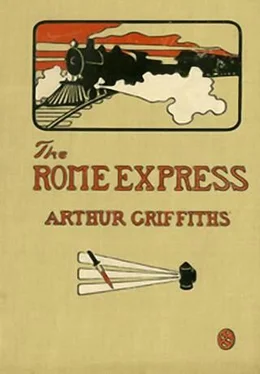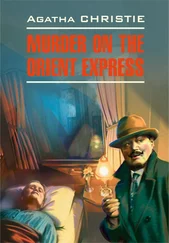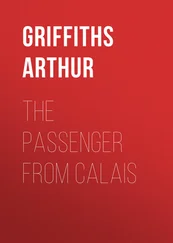Arthur Griffiths - The Rome Express
Здесь есть возможность читать онлайн «Arthur Griffiths - The Rome Express» весь текст электронной книги совершенно бесплатно (целиком полную версию без сокращений). В некоторых случаях можно слушать аудио, скачать через торрент в формате fb2 и присутствует краткое содержание. Жанр: Детектив, на английском языке. Описание произведения, (предисловие) а так же отзывы посетителей доступны на портале библиотеки ЛибКат.
- Название:The Rome Express
- Автор:
- Жанр:
- Год:неизвестен
- ISBN:нет данных
- Рейтинг книги:3 / 5. Голосов: 1
-
Избранное:Добавить в избранное
- Отзывы:
-
Ваша оценка:
- 60
- 1
- 2
- 3
- 4
- 5
The Rome Express: краткое содержание, описание и аннотация
Предлагаем к чтению аннотацию, описание, краткое содержание или предисловие (зависит от того, что написал сам автор книги «The Rome Express»). Если вы не нашли необходимую информацию о книге — напишите в комментариях, мы постараемся отыскать её.
The Rome Express — читать онлайн бесплатно полную книгу (весь текст) целиком
Ниже представлен текст книги, разбитый по страницам. Система сохранения места последней прочитанной страницы, позволяет с удобством читать онлайн бесплатно книгу «The Rome Express», без необходимости каждый раз заново искать на чём Вы остановились. Поставьте закладку, и сможете в любой момент перейти на страницу, на которой закончили чтение.
Интервал:
Закладка:
On seeing them, he came out hastily and placed himself in front, quite plainly barring their egress.
"Oh, madame, one moment," he said in a tone that was by no means conciliatory. "The manager wants to speak to you; he told me to tell you, and stop you if you went out."
"The manager can speak to madame when she returns," interposed the General angrily, answering for the Countess.
"I have had my orders, and I cannot allow her-"
"Stand aside, you scoundrel!" cried the General, blazing up; "or upon my soul I shall give you such a lesson you will be sorry you were ever born."
At this moment the manager himself appeared in reinforcement, and the clerk turned to him for protection and support.
"I was merely giving madame your message, M. Auguste, when this gentleman interposed, threatened me, maltreated me-"
"Oh, surely not; it is some mistake;" the manager spoke most suavely. "But certainly I did wish to speak to madame. I wished to ask her whether she was satisfied with her apartment. I find that the rooms she has generally occupied have fallen vacant, in the nick of time. Perhaps madame would like to look at them, and move?"
"Thank you, M. Auguste, you are very good; but at another time. I am very much pressed just now. When I return in an hour or two, not now."
The manager was profuse in his apologies, and made no further difficulty.
"Oh, as you please, madame. Perfectly. By and by, later, when you choose."
The fact was, the desired result had been obtained. For now, on the far side from where he had been watching, Galipaud appeared, no doubt in reply to some secret signal, and the detective with a short nod in acknowledgment had evidently removed his embargo.
A cab was called, and Sir Charles, having put the Countess in, was turning to give the driver his instructions, when a fresh complication arose.
Some one coming round the corner had caught a glimpse of the lady disappearing into the fiacre, and cried out from afar.
"Stay! Stop! I want to speak to that lady; detain her." It was the sharp voice of little M. Flocon, whom most of those present, certainly the Countess and Sir Charles, immediately recognised.
"No, no, no-don't let them keep me-I cannot wait now," she whispered in earnest, urgent appeal. It was not lost on her loyal and devoted friend.
"Go on!" he shouted to the cabman, with all the peremptory insistence of one trained to give words of command. "Forward! As fast as you can drive. I'll pay you double fare. Tell him where to go, Sabine. I'll follow-in less than no time."
The fiacre rattled off at top speed, and the General turned to confront M. Flocon.
The little detective was white to the lips with rage and disappointment; but he also was a man of promptitude, and before falling foul of this pestilent Englishman, who had again marred his plans, he shouted to Galipaud-"Quick! After them! Follow her wherever she goes. Take this,"-he thrust a paper into his subordinate's hand. "It is a warrant for her arrest. Seize her wherever you find her, and bring her to the Quai l'Horloge," the euphemistic title of the headquarters of the French police.
The pursuit was started at once, and then the Chief turned upon Sir Charles. "Now it is between us," he said, fiercely. "You must account to me for what you have done."
"Must I?" answered the General, mockingly and with a little laugh. "It is perfectly easy. Madame was in a hurry, so I helped her to get away. That was all."
"You have traversed and opposed the action of the law. You have impeded me, the Chief of the Detective Service, in the execution of my duty. It is not the first time, but now you must answer for it."
"Dear me!" said the General in the same flippant, irritating tone.
"You will have to accompany me now to the Prefecture."
"And if it does not suit me to go?"
"I will have you carried there, bound, tied hand and foot, by the police, like any common rapscallion taken in the act who resists the authority of an officer."
"Oho, you talk very big, sir. Perhaps you will be so obliging as to tell me what I have done."
"You have connived at the escape of a criminal from justice-"
"That lady? Psha!"
"She is charged with a heinous crime-that in which you yourself were implicated-the murder of that man on the train."
"Bah! You must be a stupid goose, to hint at such a thing! A lady of birth, breeding, the highest respectability-impossible!"
"All that has not prevented her from allying herself with base, common wretches. I do not say she struck the blow, but I believe she inspired, concerted, approved it, leaving her confederates to do the actual deed."
"Confederates?"
"The man Ripaldi, your Italian fellow traveller; her maid, Hortense Petitpre, who was missing this morning."
The General was fairly staggered at this unexpected blow. Half an hour ago he would have scouted the very thought, indignantly repelled the spoken words that even hinted a suspicion of Sabine Castagneto. But that telegram, signed Ripaldi, the introduction of the maid's name, and the suggestion that she was troublesome, the threat that if the Countess did not go, they would come to her, and her marked uneasiness thereat-all this implied plainly the existence of collusion, of some secret relations, some secret understanding between her and the others.
He could not entirely conceal the trouble that now overcame him; it certainly did not escape so shrewd an observer as M. Flocon, who promptly tried to turn it to good account.
"Come, M. le General," he said, with much assumed bonhomie . "I can see how it is with you, and you have my sincere sympathy. We are all of us liable to be carried away, and there is much excuse for you in this. But now-believe me, I am justified in saying it-now I tell you that our case is strong against her, that it is not mere speculation, but supported by facts. Now surely you will come over to our side?"
"In what way?"
"Tell us frankly all you know-where that lady has gone, help us to lay our hands on her."
"Your own people will do that. I heard you order that man to follow her."
"Probably; still I would rather have the information from you. It would satisfy me of your good-will. I need not then proceed to extremities-"
"I certainly shall not give it you," said the General, hotly. "Anything I know about or have heard from the Contessa Castagneto is sacred; besides, I still believe in her-thoroughly. Nothing you have said can shake me."
"Then I must ask you to accompany me to the Prefecture. You will come, I trust, on my invitation." The Chief spoke quietly, but with considerable dignity, and he laid a slight stress upon the last word.
"Meaning that if I do not, you will have resort to something stronger?"
"That will be quite unnecessary, I am sure,-at least I hope so. Still-"
"I will go where you like, only I will tell you nothing more, not a single word; and before I start, I must let my friends at the Embassy know where to find me."
"Oh, with all my heart," said the little detective, shrugging his shoulders. "We will call there on our way, and you can tell the porter. They will know where to find us."
CHAPTER XVII
Sir Charles Collingham and his escort, M. Flocon, entered a cab together and were driven first to the Faubourg St. Honoré. The General tried hard to maintain his nonchalance, but he was yet a little crestfallen at the turn things had taken, and M. Flocon, who, on the other hand, was elated and triumphant, saw it. But no words passed between them until they arrived at the portals of the British Embassy, and the General handed out his card to the magnificent porter who received them.
"Kindly let Colonel Papillon have that without delay." The General had written a few words: " I have got into fresh trouble. Come on to me at the Police Prefecture if you can spare the time. "
Читать дальшеИнтервал:
Закладка:
Похожие книги на «The Rome Express»
Представляем Вашему вниманию похожие книги на «The Rome Express» списком для выбора. Мы отобрали схожую по названию и смыслу литературу в надежде предоставить читателям больше вариантов отыскать новые, интересные, ещё непрочитанные произведения.
Обсуждение, отзывы о книге «The Rome Express» и просто собственные мнения читателей. Оставьте ваши комментарии, напишите, что Вы думаете о произведении, его смысле или главных героях. Укажите что конкретно понравилось, а что нет, и почему Вы так считаете.












